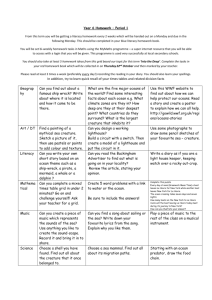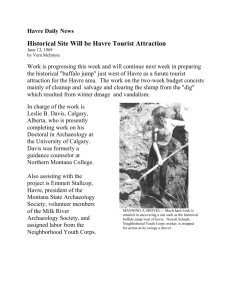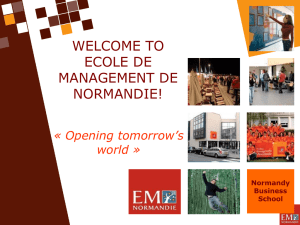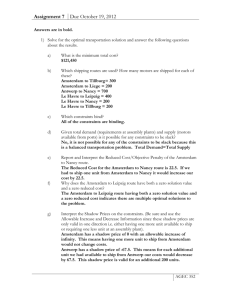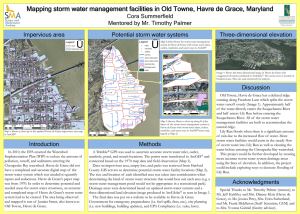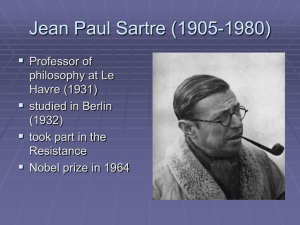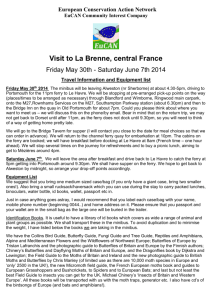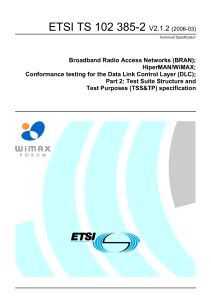The Call For Papers
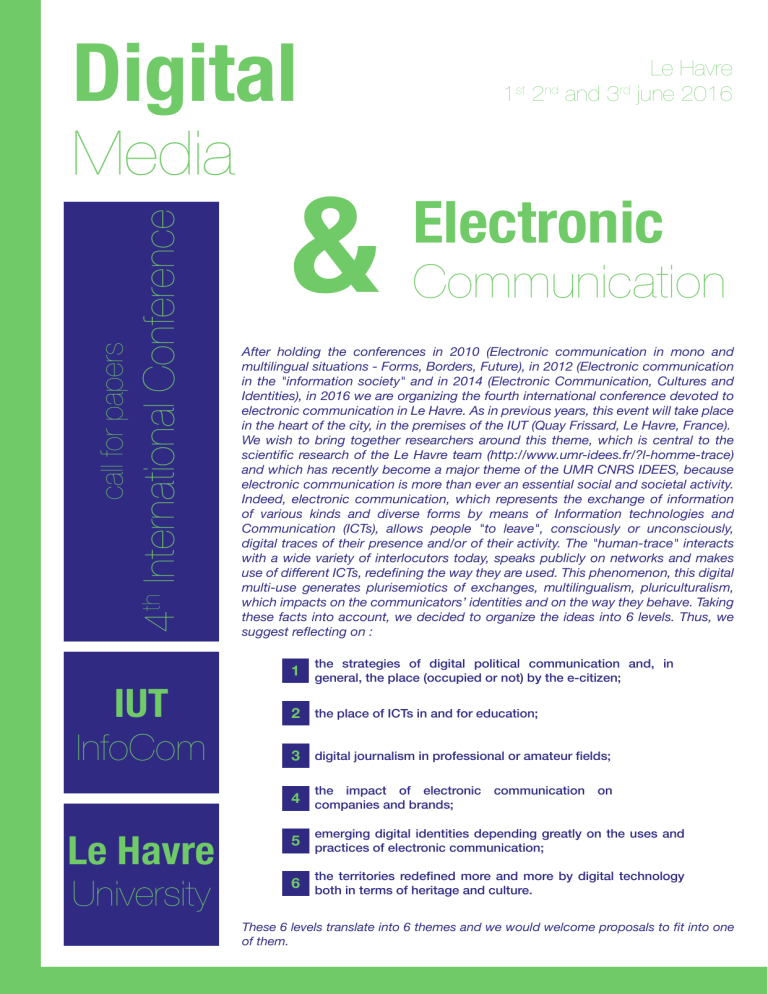
Digital
Media
&
Le Havre
1
st
2
nd
and 3
rd
june 2016
Electronic
Communication
After holding the conferences in 2010 (Electronic communication in mono and multilingual situations - Forms, Borders, Future), in 2012 (Electronic communication in the "information society" and in 2014 (Electronic Communication, Cultures and
Identities), in 2016 we are organizing the fourth international conference devoted to electronic communication in Le Havre. As in previous years, this event will take place in the heart of the city, in the premises of the IUT (Quay Frissard, Le Havre, France).
We wish to bring together researchers around this theme, which is central to the scientific research of the Le Havre team (http://www.umr-idees.fr/?l-homme-trace) and which has recently become a major theme of the UMR CNRS IDEES, because electronic communication is more than ever an essential social and societal activity.
Indeed, electronic communication, which represents the exchange of information of various kinds and diverse forms by means of Information technologies and
Communication (ICTs), allows people "to leave", consciously or unconsciously, digital traces of their presence and/or of their activity. The "human-trace" interacts with a wide variety of interlocutors today, speaks publicly on networks and makes use of different ICTs, redefining the way they are used. This phenomenon, this digital multi-use generates plurisemiotics of exchanges, multilingualism, pluriculturalism, which impacts on the communicators’ identities and on the way they behave. Taking these facts into account, we decided to organize the ideas into 6 levels. Thus, we suggest reflecting on : the strategies of digital political communication and, in general, the place (occupied or not) by the e-citizen;
IUT
InfoCom
1
2 the place of ICTs in and for education;
3 digital journalism in professional or amateur fields; the impact of electronic communication on companies and brands;
4
Le Havre
University
5
6 emerging digital identities depending greatly on the uses and practices of electronic communication; the territories redefined more and more by digital technology both in terms of heritage and culture.
These 6 levels translate into 6 themes and we would welcome proposals to fit into one of them.
1
Electronic communication and political life
This type of communication is of ever increasing importance to politicians but also to any thinking citizens, with institutions and policies, about public actions and/or the territories being restructured (in physical, virtual or identity aspects). Election campaigns
(in France, in Europe and in the world), as well as various popular electronic consultations are particularly known for revealing these upheavals, whether they are official, like the works led by the Digital National Council (Cnn) in France, or more unofficial like digital petitions.
In this theme we expect proposals dealing with the changes led by digital media in the process of political communication, such as the following areas:
• e-citizenship, public opinion, participation and political commitment;
• political marketing and the uses of electronic communication in election campaigns;
• digital media and intermediate organizations (political parties, interest groups, etc.);
• e-government, local and informal forms of governance;
• virtual discursive space and political words;
• etc
2
ICTs, education through digital media and education in digital media
Digital media irradiate and/or illuminate our contemporary societies and logically penetrate one of its key institutions: the education system. Thus, all those involved in education (transmission and reception) deal with the connected objects (and not only ICTs) which they use most of the time for educational purposes. These objects and digital media in general are so significant that they influence most of the theories of language learning, languages, and other subjects and knowledge which seems more accessible because it is within easy reach of everybody, right at our fingertips.
There are numerous aspects to this theme:
• E-learning, m-learning, digital teaching - learning;
• Serious games, video games and virtual world for educational goals;
• Reading and writing on screen, standards and electronic (socio) linguistic variations;
• MOOC, TBI, B2I and C2I, ENT, Moodle and FOAD, Technologies of Information and Communication for Teaching;
• etc
3
Journalism in the digital era
The events which make the news today are reported, structured, and passed on by women and men equipped with digital media.
This allows many people around the world to act as journalists, with all the benefits, but also all the dangers, that this entails. But they are also the tools of the trade used by professional journalists who can no longer do without ICTs and who make full use of digital data accessible on the Web. The role of digital social networks in this context is revealing a new way of understanding information, as well as constructing, processing, and spreading it.
The themes proposed for discussion are as follows:
• on-line journalism and socio-digital network;
• participative journalism and civic journalism;
• source, data journalism, rich media writing, transmedia and web documentary;
• communication, information and electronic propaganda;
• etc.
4
Brands and electronic communication
The inevitably close relationship between companies and brands is today brought about by four agents: companies, brands, ICT and, thanks to them, human beings. Indeed, electronic media are fundamental cogs in the functioning of organizations both in terms of communication and management, strategic monitoring and economic intelligence, each of them sometimes leading up to e-commerce. They are essential so much for brands that digital communication strategies are constantly developing. They are sometimes integrated into 360 communication strategies but are increasingly self-sufficient often because those involved in the field and marketing specialists develop innovations, create contents and anticipate customers’ behaviour and consumption channels in an efficient way.
In this context we suggest discussing the following themes:
• internal communication and digital (360°) communication of brands;
• management, community management and customer relationships in socio-digital networks;
• electronic and/or mobile marketing and advertising;
• e-reputation strategic monitoring and economic intelligence;
• etc.
5
Identities and digital public space
While politics, education, information, advertising and marketing are fully benefiting from the modern digital era, men and women
(the “human-trace”) are also highly connected (or sometimes disconnected). The connected presence, this digital (omni)presence, conditioned by practices and varied uses, influences bodies, cognition and identities which express themselves «differently». So, we can show ourselves on a thematic blog or a dating site, express our ideas and/or our culture on online social networks, indicate an action or denounce a fact immediately via Twitter while having a multilingual discussion through chat, SMS or by means of the audio headset which accompanies sessions of passionate gaming. All these electronic moments are marked and significant from an identity point of view: they participate in the construction of oneself and others, in the absent and, at the same time, so much present digital otherness.
The underlying questions are numerous and can be grouped under the following themes:
• personal data, e-reputation and digital traces;
• hyperconnectivity, disconnection, the blurring of boundaries between private and public spheres;
• pen names and avatars, gaming, virtual communities;
• present bodies / computerized bodies, protection and publicisation of bodies;
• etc.
6
Territories, cultural actions and digital innovations
ICTs invade the everyday life of individuals all around the world and, logically, have an impact on the territories on which we live. The questions of planning, development and/or coverage are fundamental, in the same way as the questioning about the emergence of new territories: places, spaces, digital spheres in which practices and various electronic uses develop. Digital media, connected objects modify and enrich them by drawing gradually the outlines of the home of tomorrow and the city of tomorrow: an intelligent city in which meanings and actions will be inevitably diverse. In the same vein, today it is becoming possible to discover heritages, cultures and histories remotely. Although virtual tourism has not yet become completely the norm, digital technology unmistakably facilitates the movement of tourist populations and makes places and cultures, which used to be difficult to comprehend, accessible to everyone.
The themes to discuss within this area are varied:
• digital development and e-territory;
• cloud, big data, open data and self-data;
• tourism, art and culture in the digital era;
• intelligent city, intelligent housing and mobility, electronic divide and isolation;
• etc.
All proposals to include:
• The title of the paper,
• a summary of 3 500 characters including spaces,
• registration within one of the 6 themes suggested,
• personal details and institutional affiliation of the author.
Proposals must be submitted by 31st January
2016 to the following address: soumission@colloquelehavre2016.org
Publication(s)
The papers will be produced as short publications
(8 pages) in the conference proceedings (paper version) available for the opening of the conference.
At the end of the conference and according to the quality of the papers presented, a long publication
(15 pages) is likely to be suggested.
It will be decided by the specially appointed reading committee.
They will be assessed, by double-blind peer review, by the members of the scientific committee.
Schedule
31 st january 2016 deadline for submission of papers
The languages of the conference are
French and English.
Further information is available at the following address: www.colloquelehavre2016.org
15 th february 2016 notification of acceptance
15 th april 2016 deadline for conference registration and submission of abstracts (8 pages) for the conference proceedings
Registration fees academics and researchers
110 €
Phd Students
70 €
The registration fee covers a copy of the conference proceedings, lunch and coffee-breaks.
Organisation Committee
Carolina Chighizola
(Le Havre University)
Christelle Crumière
(IUT of Le Havre)
Guillaume Delignières
Daiana Dula
(Rouen University)
Eric Guéguen
(IUT of Le Havre)
Marina Haan
(IUT of Le Havre)
Guillaume Le Mignot
(IUT of Le Havre)
Fabien Liénard
(IUT of Le Havre. Team leader)
Basilia Marchandise-Ruiz
(IUT of Le Havre)
Lilou Rouzès
(IUT of Le Havre)
Clotilde Vaissaire
Sami Zlitni
(IUT of Le Havre. Team leader)
Scientific Committee
Ibrahim Albalawi
(King Saud University – Riyadh - Saudi Arabia)
Thomas Atenga
(University of Douala – Cameroon)
Synda Ben Affana
(University of Quebec- Trois-Rivières – Canada)
Michel Bussi
(Rouen University)
Nedjma Cherrad
(Constantine University – Algeria)
Joël Colloc
(Le Havre University)
José Luis Dader
(Complutense University of Madrid – Spain)
David Douyère
(Tours University)
Alain-Philippe Durand
(University of Arizona – United States of America)
Béatrice Galinon-Mélénec
(IUT of Le Havre)
Gilles Gauthier
(Laval University – Quebec – Canada)
Kamel Gharbi
(University of Bahrain – Manama – Bahrain)
Sadok Hammami
(University of Manouba – Tunis – Tunisia)
Sung-do Kim
(Korea University – Seoul – South Korea)
Alain Kiyindou
(Bordeaux University)
Pascal Lardellier
(Bourgogne University)
Dawn Marley
(University of Surrey – England - UK)
Arnaud Mercier
(IFP, University of Paris 2)
Francesca Pasquali
(University of Bergamo – Italy)
Randal Pompeu
(University of Fortaleza – Brazil)
Sophie de Ruffray
(Rouen University)
Adrian Staii
(University of Lyon)
Jacques Walter
(Metz University)
Digital media
&
international
Conference
Electronic
communication
1 st 2 nd
3 rd june
2016
Further information is available at the following address: www.colloquelehavre2016.org
IUT
InfoCom
Le Havre
University
Call For Papers
D igital
M eDia anD
e lectronic
c oMMunication
International Conference
Le Havre, June 1
st
, 2
nd
& 3
rd
, 2016
Le Havre IUT. Information-Communication Department
IDEES Le Havre (UMR CNRS 6266). Le Havre University
Proposals must be submitted by 31
st

